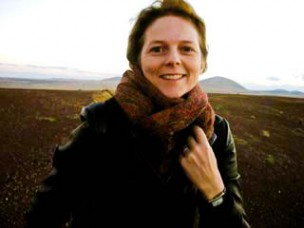
Shapiro-Silverberg Professor of Creative Writing Elizabeth Willis is a widely-published poet and literary critic. She has written five books, the most recent of which, “Address,” was published by Wesleyan University Press in 2011. She is now in the middle of writing a book of prose poetry in addition to teaching the Intermediate Poetry Workshop. The Argus caught up with Willis about translating Shakespeare, the transportive nature of imagination, and the many things that she is currently reading.
The Argus: So what’s on your bookshelf?
Elizabeth Willis: Well, actually, I’ve been reading a ton of things lately. I’ve been reading the novels of a South American fiction writer named Cesar Aira: I’m now reading “How I Became a Nun,” which is fantastic. I’ve been reading a biography of Paul Robeson, the activist and actor and incredible singer. I’ve been reading a book of essays by Yusef Komunyakaa, who’s coming to visit [the University] next week. I’ve also been reading a chapbook by a poet who’s a Wesleyan alum named Simone White [’93], which is just wonderful. Let’s see, what else have I been reading? I’ve been reading an essay about Joseph Cornell written by P. Adams Sitney, a well-known film critic. I’ve been reading the work of another poet named Fred Moten, who also has a great book about poetry called “In the Break.” I’ve also been reading Shakespeare’s sonnets again. Another amazing book I’m reading is titled “Memorial.” It’s a version of the “Iliad” by the British poet Alice Oswald.
A: Are Shakespeare’s sonnets something you revisit a lot?
EW: Not a lot, but I just wrote a retranslation that was published in an anthology. As I was reading the anthology and seeing other people’s translations, it just brought me back to the originals.
A: Translations of Shakespeare?
EW: Yes, bringing them into contemporary language and into contemporary poetic form. It’s a very loose translation, actually.
A: What was that process of translation like?
EW: It was really fun because the original is so great. And because language uses changed so much, there are all these really interesting options for how you can reshape the poem but keep the sensibility intact. But working with such a great original is really fun.
A: That must be a really interesting thing to be doing.
EW: Yes, but I also think that writers are translating all the time, from visual fields into language, or from experience into language. That’s also an act of translation.
A: Does that go for other types of writing as well, like literary criticism?
EW: What you’re talking about, which I think is really interesting, is the fact that acts of interpretation are acts of translation, and vice versa. When you’re making a translation, you’re asserting a certain reading of the original in an interpretation. In some ways, I think the most intimate information about a person is how they see the world—how they interpret the world. It’s very personal information. So even if a poem isn’t directly about a particular experience, it’s revealing of a sensibility.
A: What have you been working on lately?
EW: I’ve been writing a lot of prose poetry. And right now I’m about exactly in the middle of a book-length project. It’s the first time I’ve really worked with different characters. There are other people who are speaking in the text, and that’s a really different thing to work with. And so I feel like I’ve been learning a lot about narrative, for instance.
A: So are these different characters in conversation with each other within your poetry?
EW: They are, but kind of trans-historically. So what’s happening to somebody in, say, the early 19th century might rhyme with something that’s happening, say, in the Civil Rights Movement in the 20th century. So it’s playing with the way that one narrative informs another, even so people who don’t even know each other have a certain kind of relationship. It’s fun, because it’s almost like it’s a different country I get to visit when I’m working on it. It has a life of its own.
A: Do you feel like your writing always takes on a life of its own?
EW: When the process is working well, I like for it to be integrated into my life, but the imagination is something that transports you. So even if the writing you’re doing is interpreting what’s immediately around you, there’s that exhilarating flash of understanding or of formulating an idea about it that is kind of transportive in a certain way.
A: That’s an interesting way of looking at it. So you’re teaching one course at Wesleyan this semester, right?
EW: Yes, the Intermediate Poetry Workshop. And then I’m working with two really wonderful thesis students. We’re basically reading one book a week, a few classic texts of American poetry, and then some really contemporary work. A few of these people are coming to campus to give readings, so that’s really nice.
A: Where were you before you came to Wesleyan in 2002?
EW: Before I was here, I was teaching in a graduate creative writing program, an MFA program, at Mills College in Oakland, California. So I went from working almost entirely with graduate students to working entirely with undergrads.
A: What was that transition like?
EW: It was interesting. I immediately loved working with Wesleyan students, because no matter what kind of background they had in poetry, they were able to take it really far. And that’s really exciting to see, when somebody’s understanding of a work really takes off. And, I don’t know, you guys are just great people to work with. Really engaged. And not just engaged in literary interpretation, but really aware of and critical of what’s happening in the political world and the social world, and I love the complexity that that can bring into a classroom setting.


Leave a Reply